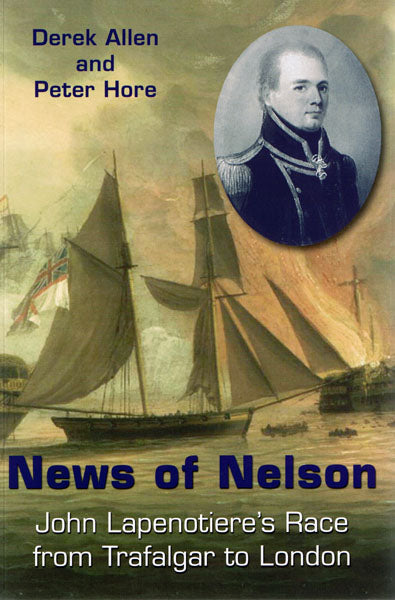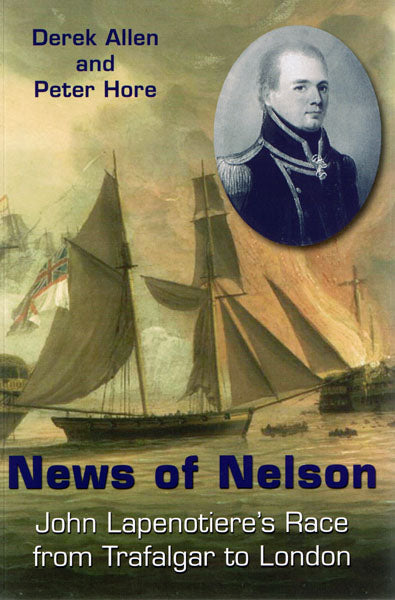Art Marine
News of Nelson - Derek Allen and Peter Hore
News of Nelson - Derek Allen and Peter Hore
Couldn't load pickup availability
News of Nelson is the life-story of John Lapenotiere, the story of the ten Pickles who have served in the Royal Navy, and the origins of Pickle night. It is also the definitive account of how Lapenotiere in the second Pickle brought the news of the battle of Trafalgar and the death of Nelson to London. News of Nelson contains four colour plates with a recently discovered new portrait of Lapenotiere and original research by Derek Allen and Peter Hore.
Chapters include: Prologue, From Ilfracombe to Liskeard, In the Footsteps of
Cook, The Tale of Two Pickles, A Schooner by Any Other Name, In the
Doldrums, In a Pickle, The Pickle Bites, The Battle of Trafalgar, The Storms
of Fire and Wind, The Race to London, Master and Commander, Postscript.
Prologue
Cold fog gripped the city though it was only early November, reducing visibility to a few yards: decent folk had gone to bed long ago. Candlelight shimmered in the face of a clerk as he huddled forward over his desk, his pen scratching the paper. Little else stirred in the small rooms behind the imposing buildings which faced Whitehall, except in the board room of the Admiralty where William Marsden blew on his fingers and rubbed his eyes. He was turning their Lordships’ discussions of the previous day into orders and letters to the fleet. A clock chimed one in the morning.
The immediate danger of invasion was over, he felt sure, now that Bonaparte had broken camp at Boulogne and marched off into deepest Europe, but he felt equally certain that the danger would return or a disadvantageous peace would be forced upon Britain unless the Frenchman’s fleet could be destroyed. Then there was that worrying news which he had read in the Morning Post a few days ago. The newspapers were full of reports of a battle at Ulm and the shocking surrender of the Austrians. Reports said that 50,000 were killed, wounded or captured and 65 guns, and Mack’s corps had escaped a trap only for him to surrender later. Nothing had been heard from Nelson or his fleet off Cadiz for a week or more, but the Morning Post had carried a story about fighting far away off Cadiz. Marsden’s chief, Lord Barham the First Lord of the Admiralty wanted news and wanted news badly.
Startlingly somewhere in the still night, through the ochred glass which dripped with condensation, Marsden heard the unexpected clatter of hooves on the cobles below in the courtyard and he strained to understand the raised voices.
In the courtyard the watchman jumped to his feet and seized a guttering torch: as he waved it in warning, it burst into light, glinting on a bright yellow post chaise which had entered the stone arch at a fast trot, far too fast for London’s peasoup fog. The horses shied at the sudden flame, slipping on the damp cobbles, and the postillion swore roundly at him. Before the body of the carriage had swayed to a halt, a passenger sprang to the ground with the ease of someone used to meeting slippery moving decks, and ran forward to rattle the glazed doors of the Admiralty. The steam rose from the sweating horse and their harnesses jangled.
The watchman was used to unexpected callers late at night. He was also used to assessing strangers and seeing off those who were unwanted, but he sensed that there would be no stopping this one. He was of middle height, well-fed even slightly stout, a large nose and receding hairline: from his greying hair, his age, and lined face he was nearing middle age. The sea officer had flung back the shiny black tarpaulin coat he had worn for shelter in the freezing carriage revealing a lieutenant’s uniform. Rather old for his rank thought the watchman and very impatient. The watchman thought he had seen this one before a year or two back.
Inside the portico a porter stumbled backward as the lieutenant pushed the doors inwards, demanding to be shown to the secretary to the Admiralty, he mixed the long vowels of a west countryman with the air of someone used to command. The porter gestured the way and the lieutenant bounded to the top of the stairs where Marsden froze in the recessed doorway of the boardroom sheltering a candle with his hand. The lieutenant buttons and lace were covered with verdigris and only dimly glinted in the glittering light.
Without waiting for further explanation the breathless officer announced, “Sir! We have won a great victory but we have lost Lord Nelson!”
The officer was John Lapenotiere, whose Huguenot family had served the British crown for five generations, and an extraordinary chain of events had brought him to the doors of the British admiralty at one o’clock on the morning of 6 November 1805. This is his story.
Share


